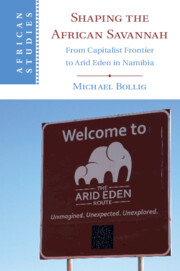Crossref Citations
This Book has been
cited by the following publications. This list is generated based on data provided by Crossref.
Østebø, Terje
2020.
Islam, Ethnicity, and Conflict in Ethiopia.
Bollig, Michael
and
Vehrs, Hauke-Peter
2020.
Abundant herds: Accumulation, herd management, and land-use patterns in a conservation area.
Pastoralism,
Vol. 10,
Issue. 1,
Heydinger, John
2021.
Human-Lion Conflict and the Reproduction of White Supremacy in Northwest Namibia.
African Studies Review,
Vol. 64,
Issue. 4,
p.
909.
2021.
Race and Diplomacy in Zimbabwe.
p.
346.
Pailey, Robtel Neajai
2021.
Development, (Dual) Citizenship and Its Discontents in Africa.
Bollig, Michael
2021.
Materiality, inequality, and future‐making as focal points of future engagement of economic anthropology with climate change.
Economic Anthropology,
Vol. 8,
Issue. 1,
p.
180.
2021.
Revolutionary State-Making in Dar es Salaam.
p.
330.
Bollig, Michael
and
Vehrs, Hauke-Peter
2021.
The making of a conservation landscape: the emergence of a conservationist environmental infrastructure along the Kwando River in Namibia's Zambezi region.
Africa,
Vol. 91,
Issue. 2,
p.
270.
Wenborn, Michael
Svensson, Magdalena S.
Katupa, Stein
Collinson, Roger
and
Nijman, Vincent
2022.
Lessons on the Community Conservancy Model for Wildlife Protection in Namibia.
The Journal of Environment & Development,
Vol. 31,
Issue. 4,
p.
375.
Hoffman, M. Timm
2022.
Book review of Shaping the African Savanna by Michael Bollig.
Pastoralism,
Vol. 12,
Issue. 1,
Coppock, D. Layne
Crowley, Luke
Durham, Susan L.
Groves, Dylan
Jamison, Julian C.
Karlan, Dean
Norton, Brien E.
and
Ramsey, R. Douglas
2022.
Community-based rangeland management in Namibia improves resource governance but not environmental and economic outcomes.
Communications Earth & Environment,
Vol. 3,
Issue. 1,
Miyamoto, Kana
2022.
Traditional authorities, legal power and land disputes in north-west Namibia.
Anthropology Southern Africa,
Vol. 45,
Issue. 1,
p.
16.
Heydinger, John
2023.
Community conservation and remote sensing of the desert-adapted lions in northwest Namibia.
Frontiers in Ecology and Evolution,
Vol. 11,
Issue. ,
Lüder, Lars
and
Kalvelage, Linus
2023.
Regional resilience and social-ecological systems: the impact of COVID-19 on community conservation in Namibia.
African Geographical Review,
p.
1.
Müller-Friedman, Fatima
and
Friedman, John
2023.
Modernism on the margins: A genealogy of Namibia’s (post-)apartheid spaces.
Environment and Planning C: Politics and Space,
Vol. 41,
Issue. 4,
p.
735.
Kalvelage, Linus
Diez, Javier Revilla
and
Bollig, Michael
2023.
Valuing Nature in Global Production Networks: Hunting Tourism and the Weight of History in Zambezi, Namibia.
Annals of the American Association of Geographers,
Vol. 113,
Issue. 8,
p.
1818.
Heydinger, John
2024.
Etosha Pan to the Skeleton Coast.
p.
447.
2024.
Black Soldiers in the Rhodesian Army.
p.
283.
Sullivan, Sian
and
Suro Ganuses, Welhemina
2024.
Etosha Pan to the Skeleton Coast.
p.
307.
Piemontese, Luigi
Terzi, Stefano
Di Baldassarre, Giuliano
Menestrey Schwieger, Diego A.
Castelli, Giulio
and
Bresci, Elena
2024.
Over-reliance on water infrastructure can hinder climate resilience in pastoral drylands.
Nature Climate Change,
Vol. 14,
Issue. 3,
p.
267.





